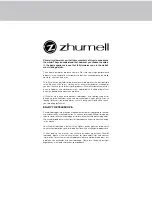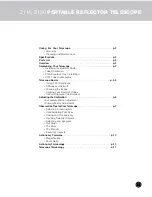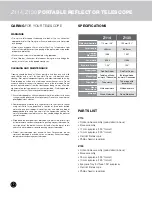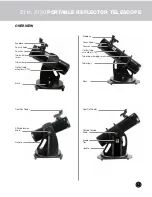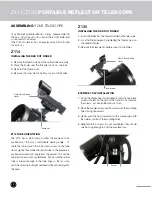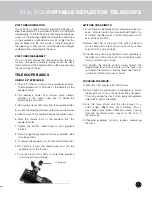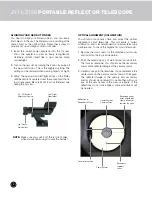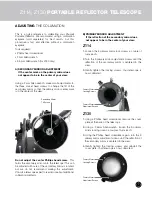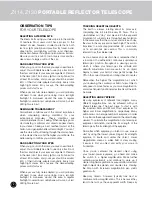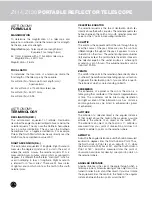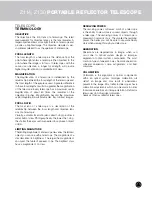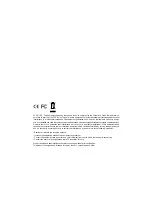
Z114, Z130
PORTABLE REFLECTOR TELESCOPE
1
Caring For Your Telescope
. . . . . . . . . . . . . . . . . . . . . . . . . . . . .
p.2
•
Warnings
•
Cleaning and Maintenance
Specifications
. . . . . . . . . . . . . . . . . . . . . . . . . . . . . . . . . . . . . . . . .
p.2
Parts List
. . . . . . . . . . . . . . . . . . . . . . . . . . . . . . . . . . . . . . . . . . . .
p.2
Overview
. . . . . . . . . . . . . . . . . . . . . . . . . . . . . . . . . . . . . . . . . . . .
p.3
Assembling Your Telescope
. . . . . . . . . . . . . . . . . . . . . . . . . . . . . .
p.3
•
Installing the Red Dot Finder
•
Tube Orientation
•
Z130 Eyepiece Tray Installation
•
Z130 Tube Disassembly
Telescope Basics
. . . . . . . . . . . . . . . . . . . . . . . . . . . . . . . . . . . . .
p.4-5
•
Using 1.25” Eyepieces
• Altitude and Azimuth
•
Focusing the Image
•
Aligning your Red Dot Finder
•
Optical Alignment (Collimation)
Adjusting the Collimation
. . . . . . . . . . . . . . . . . . . . . . . . . . . . . . . . .
p.6
• Secondary Mirror Adjustment
• Primary Mirror Adjustment
Observation Tips for Your Telescope
. . . . . . . . . . . . . . . . . . . . . . . . .
p.7
•
Selecting a Viewing Site
•
Dark Adapting Your Eyes
•
Seeing and Transparency
•
Tracking Celestial Objects
•
Selecting and Eyepiece
•
The Moon
•
The Stars
•
The Planets
•
Deep Sky Objects
Astronomy Formulas
. . . . . . . . . . . . . . . . . . . . . . . . . . . . . . . . . .
p.10
•
Magnification
•
Focal Ratio
Astronomy Terminology
. . . . . . . . . . . . . . . . . . . . . . . . . . . . . . . . .
p.10
Telescope Terminology
. . . . . . . . . . . . . . . . . . . . . . . . . . . . . . . . . .
p.11


